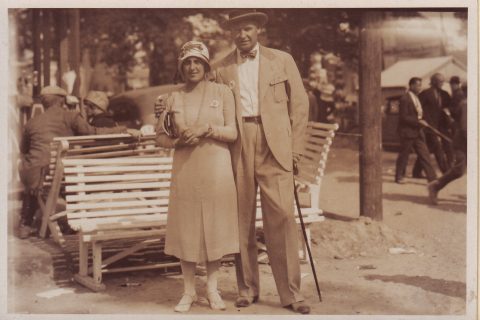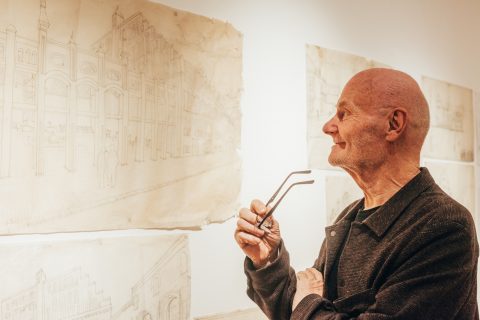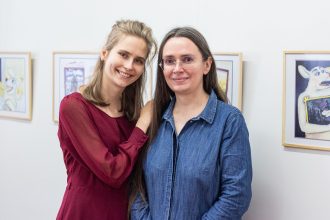Theatre director Agnija Leonova is known to the audience for such theatre plays as Sapiens, y: Alisa, and Connection (ryšys). Her latest work Breathing (Kvėpavimas), which allows you to look through a keyhole into the relationship of a couple in the face of global warming, can be seen in the Kaunas City Chamber Theatre starting February 14. Although the topic of the future and sci-fi elements are very prominent in the director’s works, the characters of the performances and their inner states perfectly reflect the experiences of a contemporary person, allowing every viewer to discover a part of themselves in the story. After the performance, we talked about original themes, new forms, virtual reality, and love for theater and people.
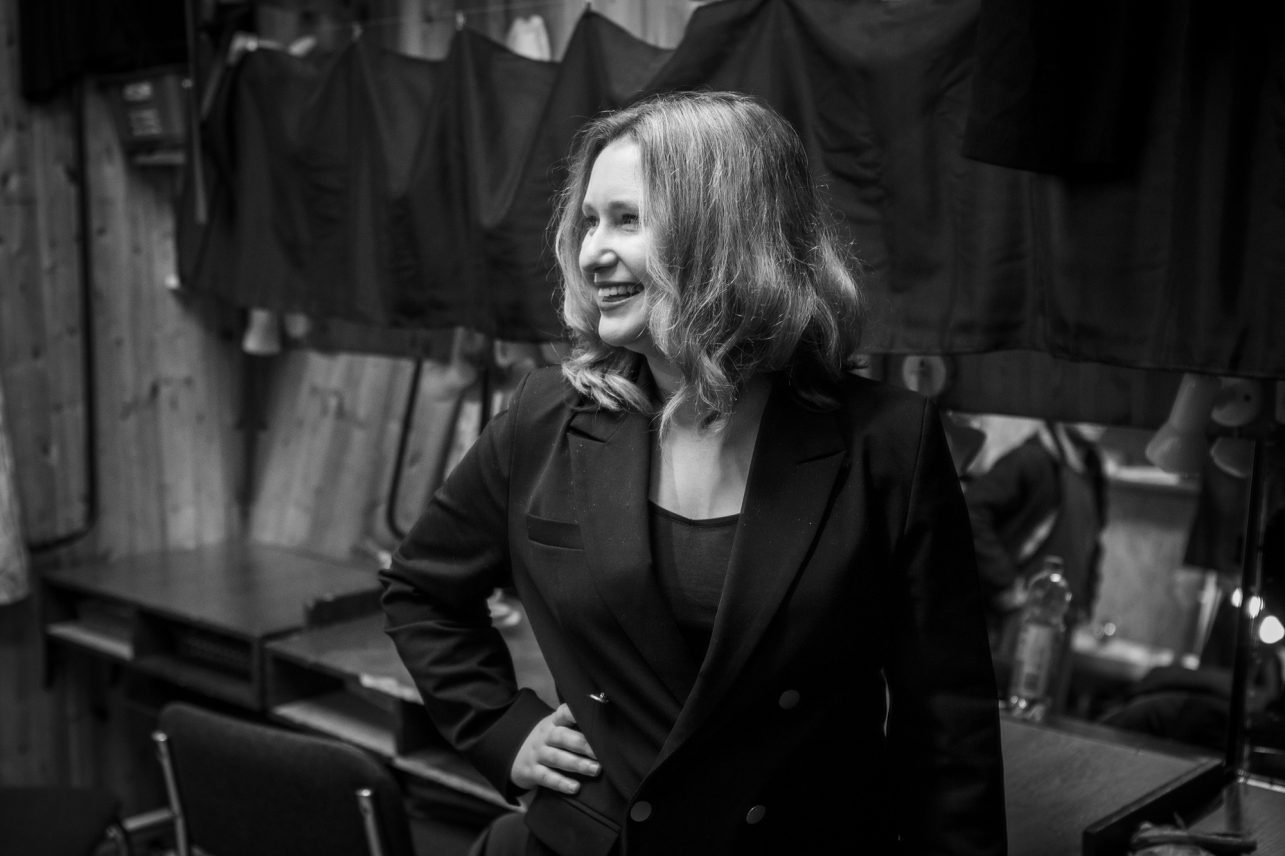
What brought you to the theater?
The theater seemed to me a special place since childhood. A place where people live differently and create magic for the viewer. I attended the Vilnius Lyceum, and at that time I was interested in various arts in my free time. The turn to the theater was a more intuitive search for meaning. Of course, like every young person, I was guided by certain idealism.
Your plays in the field of Lithuanian theater are distinguished both by their themes and your courage to look for new forms. What motivates you to experiment?
I simply create about things I find interesting and relevant these days. I don’t have a goal of being unique and I don’t specifically look for new forms. I know that I am driven by love for the future, and the desire to know where humanity will go next. I analyze these themes in theatre through human relationships. I only noticed a certain creative consistency later.
In addition to the virtual performance, original scenography, and the use of non-traditional theatre space, you expanded your creative field into the world of virtual reality (VR). Why do you find this phenomenon interesting?
Having created several plays about technology, I set out to meet the technology itself. The worlds of theatre and technology are very different. I have already created several works with VR that are not well known in the theatre community, one of which will be presented to the public soon. This is an artistic virtual reality film Fairy tale, which was created together with the director from Finland, Oleg Nikolaenko. On stage, I direct people, media, and lights. VR works completely differently. It is either 360-degree filming or computer graphics on Unity in Unreal game processors. Processes take place with different specialists with completely different experiences and knowledge, everything is planned differently, and funding is sought differently.
In my spare time, I try to find parallels between these mediums and plan to write an artistic study about it to bring these two worlds together. There are many examples in the world where these media are combined. I was very happy when the Lithuanian Council for Culture awarded me a scholarship for my research. It is possible to follow a strange path, but it should be needed by more people than you.
Visions of the future, futuristic scenarios, and science fiction are often at the center of your work. Why does it attract you?
This is the love for the future. In the beginning, I brought ideas from books and discussions with friends. We used to write together with playwrights Matas Vildžius and Kirilas Fokinas. I have also found several plays, for example, Gintaras Grajauskas’ Network (tinklas) and Duncan MacMillan’s Lungs. I’ve skimmed over a hundred science fiction plays. I realize that I want to stage a play when I discover a topic that is interesting and worth analyzing. When I started creating, it was an intuitive choice from the phenomena around me, and later it became a conscious search.
Now I would like to try something new. I am interested in children’s plays because it also has to do with love for the future. Of course, this is a radically different craft. Sometimes I come to performances for children and just watch how they react to the action on stage, I think about what tools should be used to excite the curiosity of the new generation of viewers. During Kitoks ‘23 Festival, I saw a perfect performance for teenagers by Bronks theater called The Happy Few. Basically, the entire direction of the play was aimed at the young generation. The montage is done in such a way that it becomes a theater for the new generation of viewers. Both the theme and the form spoke about it. The play is about the Instagram and TikTok generation, and the direction is wittily constructed from short impactful scenes. Thus, the search for new forms begins not with the desire to surprise, but with the aim of getting to know the language of art, which turns into a dialogue with the modern viewer.
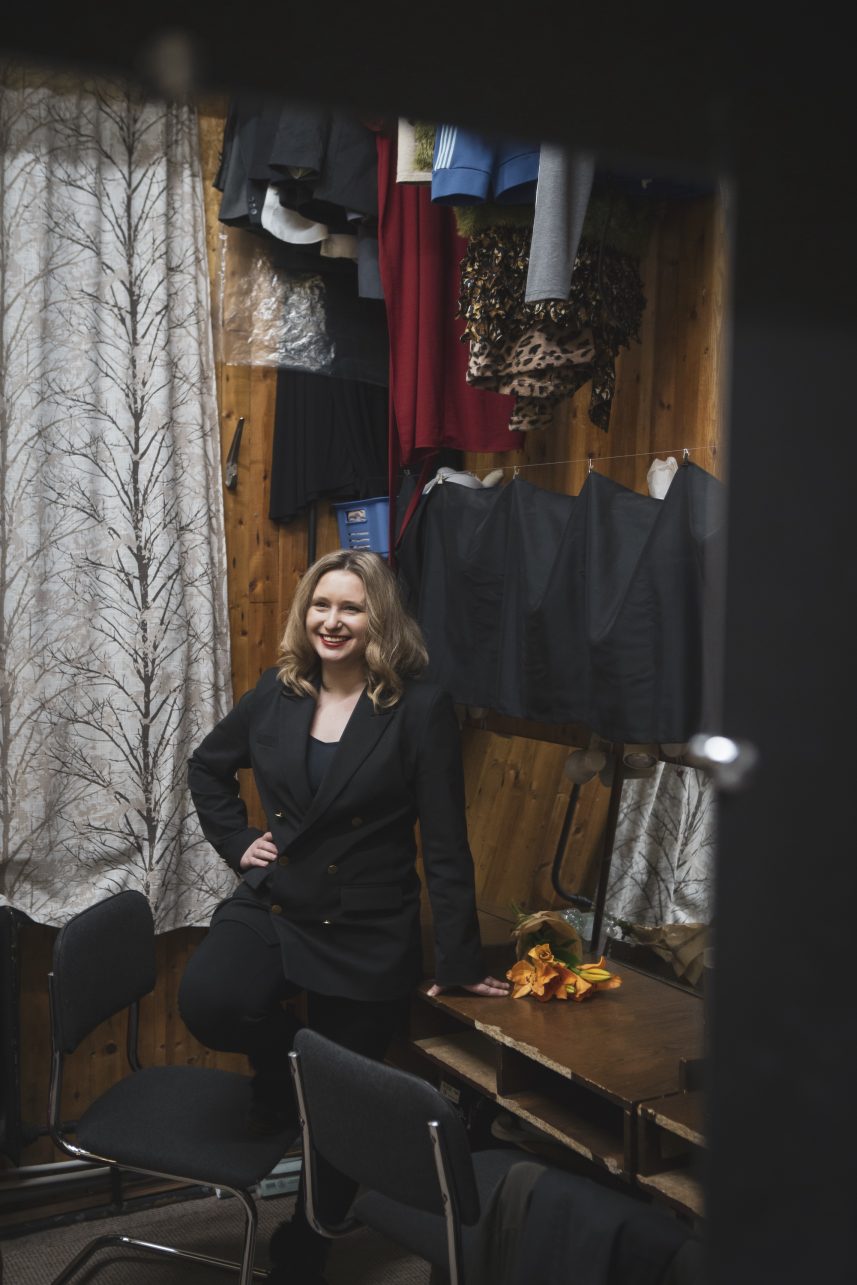
The stories of your plays often unfold in the future, the characters are faced with phenomena such as artificial intelligence, digitalization, or even space exploration and yet at the center of all of them we find a human connection. Why is it interesting for you to analyze this topic, which never loses its relevance, in the context of future perspectives? How can they help us reflect on our relationship with each other today and its changes?
There is always a person in the center. We discuss a lot with technology specialists what the future will be like when society changes, for example, due to augmented reality (AR) glasses, and the progress of artificial intelligence. Certain professions will disappear, and new ones will appear. I am mostly interested in what will people experience, and what their relationships will be. What will the direction of Homo sapiens will be, and how we will adapt. And, going full circle, I keep coming back to the idea that theater will be very necessary because it is the art of living with people and their relationships. It will be a necessary medium, helping one person understand another.

The relationship with another person and with our environment is the main theme of your play Breathing. The characters’ connection, love for each other, and desire to create a common future collide with awareness of ecology, and our impact on the planet and future generations. What inspired you to create this play?
While reading Lungs, I felt my topic and immediately saw that actors Šarūnas Zenkevičius and Inga Šepetkaitė will play the main characters. We are facing more than just a revolution in artificial intelligence and technology. Global warming will come and change both how society functions and people’s personal histories. Look at how the pandemic and the war in Ukraine changed us.
The main character of the play – a scientist in the field of ecology – cannot help but think about these processes, because she lives knowing how complicated the world in which a child will live will be. However, having a child is about giving meaning to your own existence. The whole play tells stories about the lives of specific people and their connections. This is the story of a relationship where the perception of future problems is only a context for the experiences of two people.
How is this performance different and how is it similar to your previous works?
For the first time, the topic of global warming is examined. This is my most actor-focused production with fewer screens and media and less technology. I know Ingas and Šarūnas well – they are wonderful creators, and I am honoured to work with them. Together we have dived into acting quests, and characters’ experiences. We are very happy that the play was nominated in four categories at the Dalia Tamulevičiūtė festival and rated as the best debut.
As you mentioned, you want to call Breathing an acting performance that focuses on dialogue. However, the non-verbal scenes that reveal the inner state of the characters also seem to be extremely important. The weighty mood of the performance is complemented by elements of light, darkness, and digital screens, which include everything from the causes of global warming to an aquarium with fish. How did all of these elements contribute to the shape and mood of the play?
After reading the play, I realized that there is a lot of text, so dialogues should be separated by scenes revealing the inner state of the characters. This makes the performance easier to watch and understand and improves its rhythm. The non-verbal part was naturally necessary and gave weight to the experiences and emotions of the characters, allowing them to express what is difficult to express in words, but can be shown with certain movements. Light and music helped to strengthen the mood here. Meanwhile, the media, and the screens, helped to depict the external world invading the inner island of the characters’ relationship. Sometimes these are interior details, and sometimes images that reveal the flow of time and provide additional context.
And is it still important to talk about love in the theatre? How, in your opinion, is this concept changing, expanding, or shrinking, as well as its understanding in the performing arts?
My plays – Breathing, Network, and y: Alisa – are about the future and about love. Talking about love is important, even Einstein said it is one of the strongest forces in the world. I cannot answer how this topic expands or shrinks in the field of theatre. That answer must come from the creative teams and the audience. In my work, this concept or understanding of love did not change radically, but new forms of its manifestation appeared, and the theme of maturity, and deeper reflections emerged.

Is creating a performance more of a reflective or an active process for you? When creating, do you pay more attention to the analysis of yourself and the people around you, or do you seek to find solutions to the analysed problems? Is it important to you that performances encourage the audience to change and improve?
It is both a reflective and an active process. Everything happens naturally when you choose the material and the topic. However, I try not to engage in pure self-analysis in the theatre, I try to get to know and experience the world – it is much more interesting to me. And it is natural that some things come from me, “Director gives a direction.” When I give direction to my reflections, elements of my worldview, discussions, and experiences naturally interfere. The performance is enhanced not only by my experiences, but also by the entire creative team, everyone brings a part of themselves to the process and the result. But I’m interested in the world we all live in, not just me.
A theatre piece is for the audience, and I never forget that. I see the audience as a conscious person who lives their own life, faces their own questions, issues, and tasks, and comes to the theatre to get something out of it. The viewer chooses whether the experience in the theatre will really affect their reality.
Finally, what do love of creation and love of people mean to you?
I am very happy about this question because currently I am experiencing a new love for creativity. I have experienced it both in the theatre and in VR creative processes. Neither area is easy, in general, I don’t think the other’s work is inherently easy. It is very important that the worries that arise along the way do not overshadow the love for what you do. Right before the interview, I was at a performance, and I was thinking about what a beautiful art form it is. For a while, I sat in an office with computers, VR glasses, holograms, and the like, and today I experience love for a person on stage. When it comes to love for a person in general, it shouldn’t be about words but daily actions. It is about how you treat your loved ones, how you communicate, and if you respect your audience. If you are capable of forgiving others and yourself. I try to preserve that love for a person in my actions.

